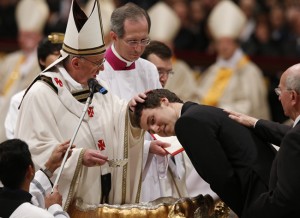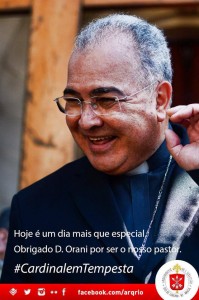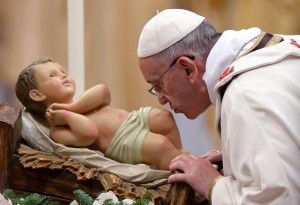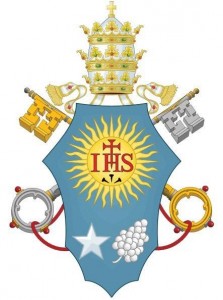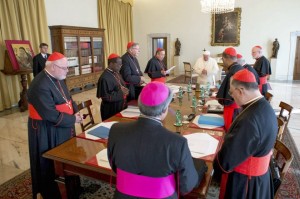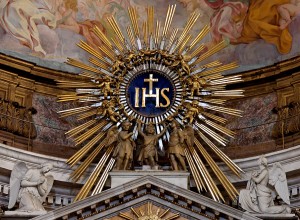 The Mass for the Feast of the Most Holy Name of Jesus, the titular feast day for the Society of Jesus, was offered today by Pope Francis in the Church of Jesus. Today the Church reminds us “to let the center of … [our] heart be occupied by Christ.”
The Mass for the Feast of the Most Holy Name of Jesus, the titular feast day for the Society of Jesus, was offered today by Pope Francis in the Church of Jesus. Today the Church reminds us “to let the center of … [our] heart be occupied by Christ.”
Gathering for prayer was an opportunity for the Holy Father to gather with his religious community in Rome to give God thanks for the many blessings received, and to give thanks for the new Jesuit saint Peter Faber (Pierre Favre). Several bishops and priests concelebrated the Mass: Cardinal Angelo Amato (Saints); Cardinal Agostino Vallini (vicar general of Rome); Archbishop Luis Francisco Ladaria Ferrer, SJ (CDF secretary); Bishop Yves Boivineau of Annecy, France, in whose diocese Faber was born, and the vicar general Father Alain Fournier-Bidoz; and the Jesuit superior general Father Adolfo Nicolas, SJ, with seven younger Jesuit priests.
Peter Faber was canonized and thereby added to the long list of Jesuit saints by Pope Francis on 17 December 2013. Faber was the first companion of Saint Ignatius of Loyola, the first priest of the Society and is known as “the second Jesuit.” Faber is also known for his competency in giving the Spiritual Exercises. The tombs of Saint Ignatius and Saint Peter Faber are located in the Church of Jesus. This is the second time since being elected the bishop of Rome that Francis has offered Mass with the Jesuits at the Jesus Church.
In his homily Francis said,
We heard Saint Paul tell us: “Have this mind among yourselves, which was in Christ Jesus, who, though he was in the form of God, did not count equality with God a thing to be grasped, but emptied himself, taking the form of a servant” (Philippians 2:5-7). We, Jesuits, want to be conferred the name of Jesus, militate under the standard of his Cross, and this means: to have the same sentiments of Christ. It means to think like Him, love like Him, see like Him, walk like Him. It means to do what He did and with his same sentiments, with the sentiments of his Heart.
The heart of Christ is the heart of a God who, out of love, “emptied” himself. Every one of us Jesuits who follow Jesus should be willing to empty himself. We are called to this abasement: to be of the “emptied.” To be men that do not live centered on themselves because the center of the Society is Christ and his Church. And God is the Deus semper maior, the God who always surprises us. And if the God of surprises is not at the center, the Society becomes disoriented. Because of this, to be a Jesuit means to be a person of incomplete thought, of open thought: because one always thinks looking at the horizon which is the ever greater glory of God, who ceaselessly surprises us. And this is the restlessness of our void, this holy and beautiful restlessness!
However, because we are sinners, we can ask ourselves if our heart has kept the restlessness of the search or if, instead, it has atrophied; if our heart is always in tension: a heart that does not settle down, a heart that does not shut itself in on itself, but which beats the rhythm of a journey to undertake together with all the faithful people of God. It is necessary to seek God to find Him, and to find him in order to seek Him again and forever. Only this restlessness gives peace to the heart of a Jesuit, a restlessness that is also apostolic, which must not make us grow tired of proclaiming the Kerygma, of evangelizing with courage. It is the restlessness that prepares us to receive the gift of apostolic fruitfulness. Without restlessness we are sterile.
This is the restlessness that Peter Favre [Faber] had, man of great desires, another Daniel. Favre was a “modest, sensible man of profound interior life and gifted with the gift of close relations of friendship with persons of all sorts” (Benedict XVI, Address to Jesuits, April 22, 2006). However, he was also a restless, uncertain and never satisfied spirit. Under the guidance of Saint Ignatius he learned to unite his restless but also gentle — I would say exquisite –, sensibility with the capacity to take decisions. He was a man of great desires; he took charge of his desires, he acknowledged them. In fact for Favre, it was precisely when difficult things were proposed that his true spirit was manifested which moved him to action (cf. Memoriale, 301). Authentic faith always implies a profound desire to change the world. Here is the question we should ask ourselves: do we also have great visions and dash? Are we also daring? Does our dream fly high? Does zeal devour us (cf. Psalm 69:10)? Or are we mediocre and content with our laboratory apostolic programs? Let us remember always: the strength of the Church does not lie in herself and in her organizational capacity, but is hidden in the profound waters of God. And these waters agitate our desires and desires enlarge the heart. It is what Saint Augustine says: pray to desire and desire to enlarge the heart. In fact it was in his desires that Favre could discern God’s voice. Without desires one goes nowhere and it is because of this that we must offer our desires to the Lord. Stated in the Constitutions is that “one’s neighbor his helped with desires presented to God our Lord” (Constitutions, 638).
Favre had the real and profound desire to “be dilated in God”: he was completely centered on God, and because of this he could go, in the spirit of obedience, often also on foot, everywhere in Europe to speak to all with gentleness, and to proclaim the Gospel. The thought comes to me of the temptation, which perhaps we might have and that so many have, of connecting the proclamation of the Gospel with inquisitorial blows of condemnation. No, the Gospel is proclaimed with gentleness, with fraternity, with love. Favre’s familiarity with God led him to understand that interior experience and apostolic life always go together. In his Memoriale he wrote that the first movement of the heart must be that of “desiring what is essential and original, that is, that the first place be left to the perfect solicitude of finding God our Lord” (Memoriale, 63). Favre demonstrates the desire “to let Christ occupy the center of the heart” (Memoriale, 68). Only if one is centered on God is it possible to go to the fringes of the world! And Favre traveled ceaselessly also on the geographic frontiers, so much so that it was said of him: “It seems that he was born not to stay put in any place” (MI, Epistolae I, 362). Favre was devoured by the intense desire to communicate the Lord. If we do not have his same desire, then we need to pause in prayer and, with silent fervor, ask the Lord, through the intercession of our brother Peter, that he fascinate us again: that fascination of the Lord that led Peter to all his apostolic “lunacies.”
We are men in tension; we are also contradictory and inconsistent men, sinners, all. But men who want to walk under the gaze of Jesus. We are little, we are sinners, but we want to militate under the standard of the Cross of the Society conferred with the name of Jesus. We who are egoistic want, however, to live an agitated life of great desires. We renew now our oblation to the Eternal Lord of the universe so that with the help of his glorious Mother we may want, desire and live the sentiments of Christ who emptied himself. As Saint Peter Favre wrote, “We never seek in this life a name that is not connected with that of Jesus” (Memoriale, 205). And we pray to Our Lady to be messengers with her Son.
A Vatican Radio report can be heard here.
 The human face of Jesus Christ, the mercy of God and the love of Holy Mother Church is only going to be known if the priest gets back into the confessional (on a daily basis?). The Pope of Mercy is calling priests to act like priests and not as bureaucrats by getting into the confessional more often.
The human face of Jesus Christ, the mercy of God and the love of Holy Mother Church is only going to be known if the priest gets back into the confessional (on a daily basis?). The Pope of Mercy is calling priests to act like priests and not as bureaucrats by getting into the confessional more often.
